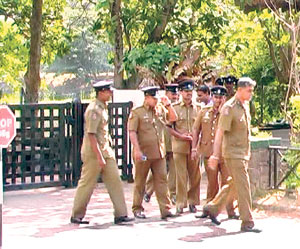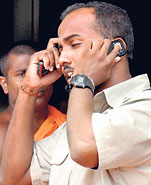President Mahinda Rajapaksa has urged the top brass at all universities to enforce strict discipline on campuses. The Presidential directive comes after a series of violent incidents were reported from leading universities around the country in recent weeks. Student unrest and police intervention has resulted in more than 25 arrests and the suspension of at least 200 undergraduates. Tension is high at a number of leading campuses.
Last Monday, at a meeting with President Rajapaksa, university vice-chancellors were advised to enforce discipline among students who were being manipulated for political purposes.
Rajarata University has been embroiled in controversy for the past month, after a group of students held the Vice-Chancellor, Professor K. N. Nandasena, hostage over a dispute on the staging of a play in the campus auditorium.
 |
| There is a strong police presence at campuses these days. Here, officers patrol the Ruhuna University premises, in Matara. Pic by Krishan Jeewaka Jayaruk. |
 |
| Recent protest at the University Grants Commission headquarters, Colombo. Pic by M. A. Pushpakumara |
According to Rajarata University undergraduates, permission to stage the play could not be obtained in time because no officials were available to grant permission. According to the authorities, permission should be obtained at least one week ahead of the event. The students had sought permission from the Vice-Chancellor on the day of the show, but the request was turned down. In defiance, the students went ahead with the performance, after taking the Vice-Chancellor hostage. The incident resulted in 19 students being suspended and seven being arrested.
Unrest continues at the campus. Last Monday the police were called in to restore order when five Faculty of Management students taking an examination were assaulted. In the violence, the examination centre was damaged. Once again, the university authorities were compelled to take stern disciplinary action. “We have had to suspend another 19 students,” Vice-Chancellor Professor Nandasena told the Sunday Times. “These students are found to be involved with the Inter-University Students Union.”
There is a strong police presence at Rajarata University.
“There are police officers all over campus,” a student who did not wish to be named told the Sunday Times. “They are in the lecture halls, in the canteens, and even outside the toilets. The student union office is occupied by the police. There is a police officer sitting in the chair used by the student union leader.”
Vice-Chancellor Professor Nandasena said the police presence was necessary to ensure that exams were not disrupted. “The ongoing exams will continue till December,” he said. “We cannot have the exam schedule disrupted. The police have been called in to ensure the safety of the students.”
However, the police presence is only adding to tensions. On Thursday, a female student claimed a policeman had seized her by the hand, but no formal complaint was made, and the incident has not been confirmed.
Meanwhile, tension is also high in the south, at the University of Ruhunu, where the Vice-Chancellor, Professor Susirith Mendis, was attacked by a student last week. Six students have been suspended, and one student is in police custody. The university authorities and the Inter-University Students’ Federation (IUSF) blame each other for the unrest.
“We have video evidence to suggest that the students were assaulted by the staff,” IUSF convenor Udul Premaratne told the Sunday Times, before he was arrested at Pitakotte on Friday.
Vice-Chancellor Professor Susirith Mendis vehemently denied the allegation. He said there was sufficient evidence to prove that it was the students who had assaulted the staff.
“As a matter of fact, I attempted to speak to one of the students,” Professor Mendis told the Sunday Times. “I patted him on the shoulder and advised him to leave quietly with his friends, without creating a scene. I was then hit with a club. That incident has been distorted and misrepresented. They are saying that I assaulted a student.”
Two separate disciplinary inquiries are under way at Ruhuna University, one by the police and the other by the university authorities, who are trying to ascertain whether other students are linked to last week’s violence.
On Tuesday, a group of adults, calling themselves “parents” and believed to be government supporters, staged a protest outside Ruhunu University, in Matara, condemning the student unions and demanding the arrest of students responsible for the violence in which the Vice-Chancellor was injured.
In Colombo, there is tension at the University of Sri Jayewardenepura, where student monks allegedly assaulted a sub-warden. The incident occurred when the victim was accompanying Vice-Chancellor Dr. N. L. A. Karunaratna on a visit to a hostel for student monks living outside the university premises.
Vice-Chancellor Dr. Karunaratna told the Sunday Times that he was acting on complaints from residents in the area that the student monks were misbehaving.
“I arrived at the hostel on Sunday at about 7.30 pm,” Dr. Karunaratna said. “I noticed that some of the monks were clad only in the adanakadaya, an undergarment worn by monks. I told them they should conduct themselves in a more becoming way, and to be mindful of the other residents, who include families and children. The monks started to argue, saying I had no right to enter the premises.”
It was then that the sub-warden was assaulted, said Vice-Chancellor Dr. Karunaratna.
The student monks have a different version of what happened at the hostel. “The monks were in their undergarments because it is very hot inside the hostel building,” Ven. Kamburupitye Gannissara Thera told the Sunday Times.
“The university should provide us with air-conditioning, or at least fans. It was the Vice-Chancellor who started the trouble. He attempted to assault a student.”
Meanwhile, another Colombo campus – the University of Kelaniya – was the scene of student agitation and police action.
On a court order, issued by Colombo Additional Magistrate Mahi Wijeratne, police evicted students forcibly occupying a hostel. The students claim they were manhandled during a pro-government demonstration, similar to the parents’ protest outside Ruhuna University, in Matara.
Two students were arrested, and at least 14 students have been suspended.
Elsewhere, in Kandy, four students of the University of Peradeniya are in police custody and nine students have been suspended over an incident in which students had allegedly jeered at the Minister of Education.
A week of student protests expected
By Yasasmin Kaviratne
Following the arrest of Inter-University Students’ Federation (IUSF) convenor Udul Premaratne, a string of protests are expected to take place this week.
 |
| Udul Premaratne |
According to IUSF acting convenor Sanjeewa Bandara, the students’ federation will be meeting Opposition parties this week to discuss campus issues. The agenda includes appealing for bail for Udul Premaratne and addressing campus issues such as the unlawful arrest and suspension of students.
Mr. Bandara said the IUSF will meet JVP representatives today to draw up a programme for Thursday’s meeting. The IUSF has already gained the support of the UNP and the United National Front, headed by MP Mano Ganesan. “Tomorrow we will meet MP Mangala Samaraweera. We have the support of Opposition groups and monks,” he said.
Referring to recent protests on campuses, Mr. Bandara said more protests were expected. abaragamuwa University and the Buddhist and Pali University will be staging protests tomorrow, while students of Rajarata University will hold a protest on Tuesday. “And on Wednesday, students of the Agriculture Faculty of Ruhuna University will stage a protest,” he added.
According to Mr. Bandara, most of the students who have been suspended or are facing disciplinary action have been falsely accused.
Camps for anti-government training run by JVP and students’ federation
The Janatha Vimukthi Peramuna (JVP) and the Inter-University Students’ Federation (IUSF) are jointly conducting training camps where university students are being trained in terror tactics, according to Higher Education Minister, S. B. Dissanayake.
Those who undergo the training are the persons behind the protests and other disruptive activity on campuses, he said. “Most of the students who have been suspended for causing trouble belong to this group,” he said. “There are others involved, and they too face suspension. The National Intelligence Bureau is on the job of locating the other members of this group.”
 |
| S. B. Dissanayake |
JVP Member of Parliament Tilwin Silva, who rejected Minister S. B. Dissanayake’s allegations, told the Sunday Times that the party would be challenging Minister Dissanayake to an open debate with JVP MP Anura Kumara Dissanayake.
“Minister S. B. Dissanayake is known to make statements without looking at the facts,” Mr. Silva said. “Students these days face many problems, and rows are erupting on all the campuses. Until these issues are resolved, there will be protests. There is no point in suppressing the student movements.”
Mr. Silva said the government was not looking at the actual problems at universities.
According to Sri Jayawardenapura University Vice-Chancellor Dr. N. L. A. Karunaratne, an estimated 200 students have undergone a subversive training funded by anti-government foreign agencies.
“The Inter-University Students’ Federation has a familiarisation programme for freshers,” he said.
“The freshers are given a ragging, and the tougher students who show they can take the ragging are taken to training camps. There are three such camps – in Padukka, Kadawatha and Homagama.”
According to the Vice-Chancellor, the ragging identifies around 75 students who are deemed suitable for the “special training”, which involves weapons training and anti-government activities.
“They return to the university after their one-month training and they take control of the university system.”
Dr. Karunaratne said the 60 Sri Jayawardenapura University students who were recently suspended belonged to this group. |






